Six individuals are largely credited as the founders of the Congress on Racial Equality: James Farmer, George Houser, James Robinson, Bernice Fisher, Homer Jack, Joe Guinn, and Bayard Rustin.
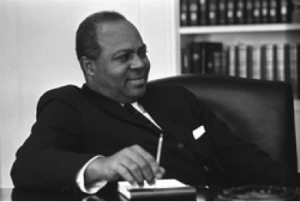 James Farmer graduated from Howard in 1941and began to work for the Fellowship of Reconciliation as the secretary of race relations. He helped the group create responses to the social ills of poverty, violence, and bigotry with a focus on non-violent resistance
James Farmer graduated from Howard in 1941and began to work for the Fellowship of Reconciliation as the secretary of race relations. He helped the group create responses to the social ills of poverty, violence, and bigotry with a focus on non-violent resistance
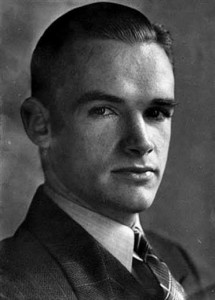 George Houser’s career as an activist began while studying at the theological seminary at UChicago. Influenced by Thoreau’s and Ghandi’s belief in non violent resistence for social change, Houser was instrumental in planning and organizing the first March on Washington in 1941 against racial discrimination in the armed forces. During this time Houser served as the youth secretary of the Fellowship of Reconciliation. The 1941 march on Washington was eventually called off when FDR gave the executive order to ban discrimination in the defense and federal bureaus. He also organized the first freedom ride known as the Journey of Reconciliation in an attempt to challenge segregation of interstate travel. This Journey gained serious publicity and was one of the first actions supported by the Congress on Racial Equality.
George Houser’s career as an activist began while studying at the theological seminary at UChicago. Influenced by Thoreau’s and Ghandi’s belief in non violent resistence for social change, Houser was instrumental in planning and organizing the first March on Washington in 1941 against racial discrimination in the armed forces. During this time Houser served as the youth secretary of the Fellowship of Reconciliation. The 1941 march on Washington was eventually called off when FDR gave the executive order to ban discrimination in the defense and federal bureaus. He also organized the first freedom ride known as the Journey of Reconciliation in an attempt to challenge segregation of interstate travel. This Journey gained serious publicity and was one of the first actions supported by the Congress on Racial Equality.
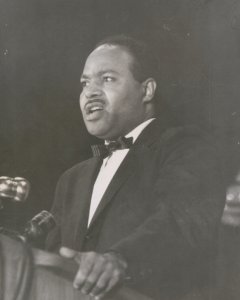 James R. Robinson was the second executive director of CORE and was credited for keeping the group financially sound. He is also credited as the “father of direct mail fundraising,” an important tactic that provided CORE with the funds needed to successfully organize.
James R. Robinson was the second executive director of CORE and was credited for keeping the group financially sound. He is also credited as the “father of direct mail fundraising,” an important tactic that provided CORE with the funds needed to successfully organize.
 Bernice Fisher joined CORE as a UChicago student studying ministry. She helped introduce the sit in technique, and used here experience in non-violent protest tactics to teach others how to behave at demonstrations.
Bernice Fisher joined CORE as a UChicago student studying ministry. She helped introduce the sit in technique, and used here experience in non-violent protest tactics to teach others how to behave at demonstrations.
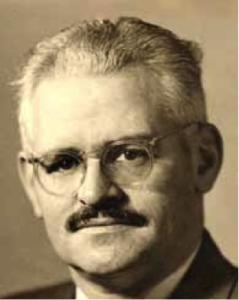 Homer Jack began as an academic studying for his PHD in biology. Eventually, he abandoned academia to study for the ministry at UChicago. While at Chicago he attended a meeting of the Fellowship of Reconciliation, the group that would later become CORE. In 1943 Jack helped to organize some of the first sit ins and was a participant in the first Freedom Ride in the southern border states in 1947.
Homer Jack began as an academic studying for his PHD in biology. Eventually, he abandoned academia to study for the ministry at UChicago. While at Chicago he attended a meeting of the Fellowship of Reconciliation, the group that would later become CORE. In 1943 Jack helped to organize some of the first sit ins and was a participant in the first Freedom Ride in the southern border states in 1947.
Joe Guinn was the head of the Chicago branch of the NAACP and served as a valuable contributor and ally to CORE.
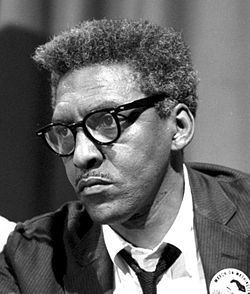 Bayard Rustin’s Quaker beginnings led to his involvement in the youth communist league in New York City in the late 1930s. In 1941 he was asked to help plan the 1941 March on Washington and afterwards continued to participate in the New York branch of CORE leading seminars on nonviolent actions throughout the 1940s and 1950s. Rustin also helped to organize the Montgomery Bus Boycott of 1955 and coordinated the 1963 March on Washington.
Bayard Rustin’s Quaker beginnings led to his involvement in the youth communist league in New York City in the late 1930s. In 1941 he was asked to help plan the 1941 March on Washington and afterwards continued to participate in the New York branch of CORE leading seminars on nonviolent actions throughout the 1940s and 1950s. Rustin also helped to organize the Montgomery Bus Boycott of 1955 and coordinated the 1963 March on Washington.
